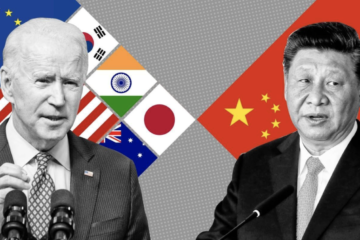The democratisation of Hong Kong is wrought with geopolitical constraints. To understand it, we must look beyond ‘us’ and ‘them’, ‘democratic’ and ‘authoritarian’.
To the Chinese Communist Party (CCP), democracy has always been secondary to economic development and stability. There are certainly moderates within the party who are not staunchly opposed to democratic reform – but even they are conservative, believing that without an appropriate level of public education and socioeconomic welfare, no democratic system could function properly across the broad swathes of Chinese territory. Hong Kong’s remarkable economic and socio-political progress, far ahead of the rest of China, has therefore unnerved the CCP.
Perhaps unsurprisingly, Beijing has repeatedly reneged their commitments to democratic reform in Hong Kong, first by delaying the constitutional timetable set out in 1997 (when Hong Kong was handed back to China by the UK), and then by outright denying the possibility of open, full democracy without CCP influence in a White Paper published in 2014. Beijing’s tightening grasp has made some Hong Kongers lose faith in civil, moderate activism and resort to radical measures: pan-Democrats made the first transition, moving to disruptive protests in the Legislative Council (Hong Kong’s legislature) while affirming “One Country Two Systems”, only to fail miserably in the legislative term between 2012-16. Now, even radical pan-Democrats have been disavowed, replaced by outright independence activists who repudiate “One Country” in the first place. These movements have unsettled the CCP, accelerating its iron fist control over channels of public debate and Hong Kong’s supposedly independent institutions. The diminishing room for compromise and negotiation has placed Hong Kongers in a difficult dilemma.
On one hand, radical protests would inevitably bring about further repression by China. An independence movement without military support, in particular, would end in bloodied disaster. On the other, mild and civil opposition has been as effective as inaction. Far from inspiring a new generation, the Umbrella Movement (the pro-democracy movement created during the massive 2014 protests) convinced many that even large scale, peaceful protest had no effect on the Chinese government – one of many reasons the internationally renowned Joshua Wong has little support at home. The opposition has therefore split into separate factions, ripping apart the delicate fabric of Hong Kong society. The independence activists grow ever more determined to start violent revolution. The moderate business sectors, fearing instability, increasingly look abroad to invest. The ‘silent majority’ of Hong Kong hold an attitude of disgust towards the radicals, lambasting their lack of civility while losing faith in change. The Communist Party need not have a “united front” – they have already prevailed through their tactical manipulations.
The pro-Beijing radicals and the anti-Beijing radicals accuse one another of tearing up Hong Kong society, when both are merely reactive agents in a boiling pot of dissent. The fundamental cause of Hong Kong’s divisions is the divergent developments of identity, progress and values between the people of Hong Kong and China. We are no longer in sync, both in political awareness and national identity, with our comrades in the Mainland. Unfortunately, we are also militarily and economically powerless to demand anything.
China’s ‘interpretation’ of the Basic Law in the recent oath-taking controversy, the ban on localist candidates in the recent Legislative Council elections, the crackdowns on the Umbrella Movement, China’s 2014 “White Paper” on Hong Kong, and many other instances, all point to the same thing: China has always believed that “One Country, Two Systems”, the fundamental constitutional principle defining Hong Kong’s relationship with China, has limits. They have stifled the democratic development of Hong Kong’s executive branch, restricted the representation and accountability of its legislature, and assaulted the authority of its judiciary. It would be simplistic to assume this means they have no desire for any fundamental freedoms in Hong Kong. Rather, they perceive freedom as dispensable when it leads to threats against the national government.
For pro-establishment supporters, the unity and stability of the country is paramount. Those who see themselves as Chinese first, and Hong Konger second, believe that excessive democratic development in Hong Kong would be detrimental to the stability of China as a whole. For them, the pro-independent movement in Hong Kong poses a security risk like no other, and therefore justifies overriding any freedom of speech or assembly, just as you would expect in any political state, both democratic or non-democratic. There is absolutely no viable middle ground between them and people who see themselves the other way around, Hong Konger first and Chinese second, as well as those who just see themselves as Hong Konger and nothing more. The westernised worldview among pan-Democrats and localists necessitates perceiving institutions as universal: that any damage to the rule of law, fundamental freedoms and democratic change necessarily means compromising the system as a whole. To us, institutions are only meaningful when they cannot be twisted to assault specific groups for their ideology and identity. They must protect us all.
No single faction – not the Hong Kong government, not the tycoons and elites, not the pro-Establishment rubber stampers, not the moderate negotiators, and certainly not the radical activists – can change the larger political landscape in China that restrains any possibility of full democracy in Hong Kong. The reality emerging for the next three decades until 2047, the iconic year in which “One Country, Two Systems” is set to expire and therefore up for renegotiation, is therefore plainly clear: either we pursue violent revolution against a soon-to-be superpower; or we put down our differences and settle with negotiations for limited democracy, one constrained by Chinese national concerns until the geopolitical reality creates an opening for change. Here is the question many are asking themselves today: is independence truly worth it? Or are we ready to settle for less?


